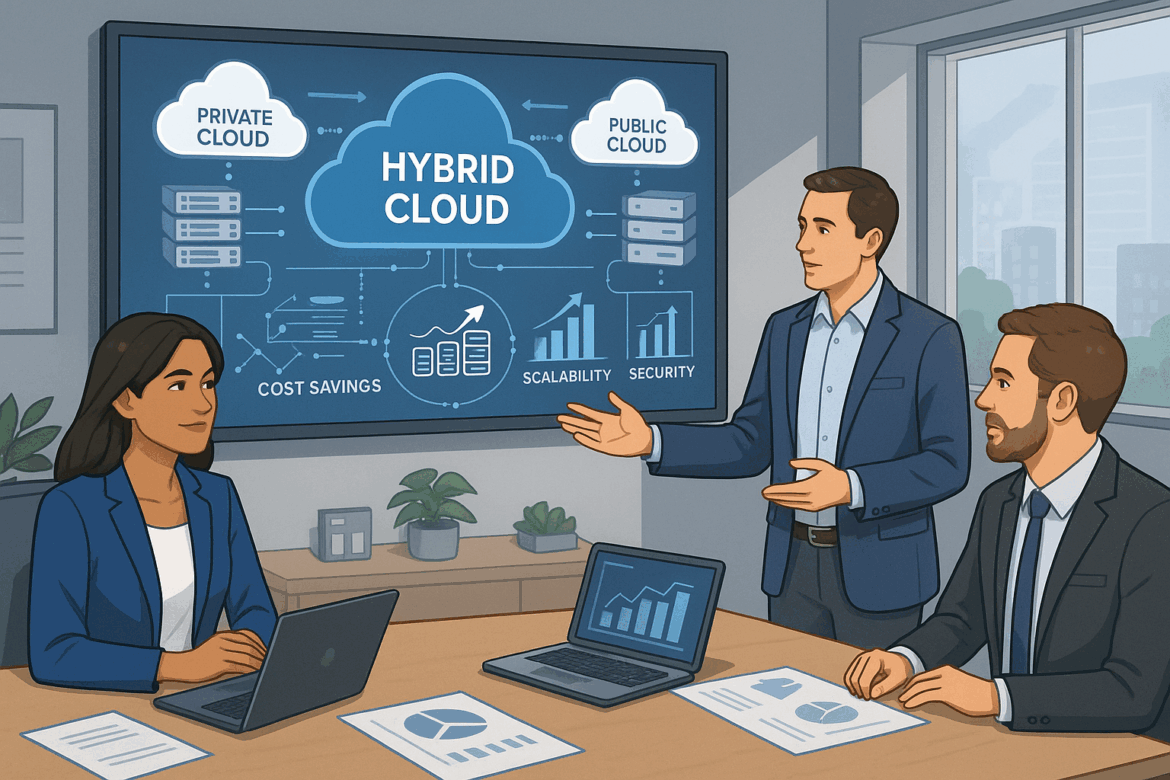As mid-sized companies expand, they need better tech solutions. Shifting to the cloud can cost a lot, while old-school setups can hold back new ideas. This is where hybrid cloud steps in — giving companies a mix of both approaches.
Let’s break down what hybrid cloud means how it operates, and why growing businesses find it so useful.
🧩 What Is Hybrid Cloud?
Hybrid cloud combines two different kinds of IT systems:
- Private infrastructure: This refers to your company’s own servers or a nearby data center.
- Public cloud services: These include platforms from other companies like Amazon Web Services (AWS), Google Cloud, or Microsoft Azure.
Combined, they enable your company to operate some functions on-site and others in the cloud — based on your requirements financial resources, and data protection worries.
💡 Why Mid-Sized Businesses Like Hybrid Cloud
Mid-sized companies value adaptability and saving money. Hybrid cloud helps in these ways:
1. Pick and Choose Resources as Needed
With hybrid cloud, you don’t need to move everything to the cloud. You can keep certain apps or specific data in-house, and use cloud services when you need extra power during busy times.
2. Save on Hardware and Upgrades
Instead of buying new servers every few years, you can add resources in the cloud when you need them. This helps you manage your IT budget better.
3. Faster Performance
Your core systems stay close (on-site), which means they can run faster, while you can send less important tasks to the cloud.
4. Better Data Control
You can keep sensitive information safe within your private systems while still getting the benefits of public cloud tools.
🏢 Real Examples of Hybrid Cloud in Action
Here’s how mid-sized companies are using hybrid cloud right now:
- Retail brands keep customer and sales data on their own servers but turn to the cloud to analyze marketing and handle website traffic spikes.
- Healthcare clinics guard patient data in-house while cloud platforms help them manage appointments.
- Finance teams secure important spreadsheets and budgets , but rely on cloud apps to work together and create reports.
This mix-and-match approach allows businesses to stay in charge while growing .
🔐 Is Hybrid Cloud Secure?
Yes — hybrid cloud can offer strong security, when companies manage it well. Here’s how businesses keep their data safe:
- Encryption: Protects your data when you move or store it.
- Access Controls: Limit system access to people who should have it.
- Backups and Disaster Recovery: Keep your data safe if things go wrong or someone attacks.
Many cloud providers also give you tools to follow rules, which helps a lot if you work in healthcare, money, or law.
🚀 What’s Next for Hybrid Cloud
Hybrid cloud is getting bigger fast — and it’s not about to slow down. Here’s what you can expect:
- Automation tools that are getting smarter decide where apps and data should be (cloud or local).
- Computing at the edge processes data nearer to the user for quicker results.
- Platforms ready for hybrid setups from leading cloud providers.
This gives mid-sized companies more options to stay in the game without spending too much.
